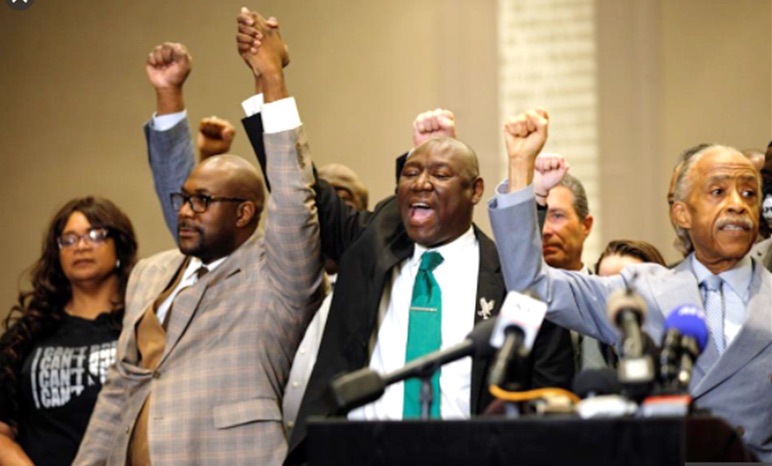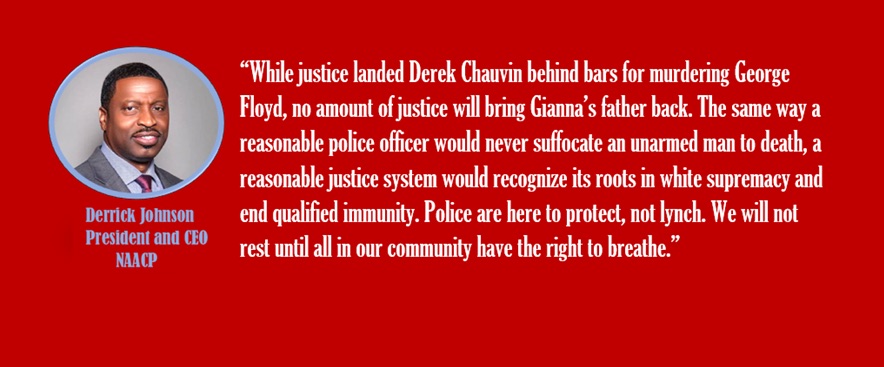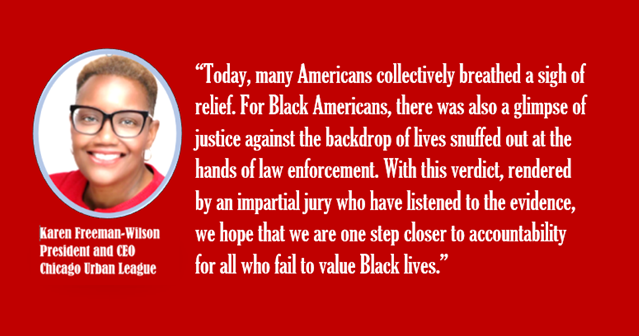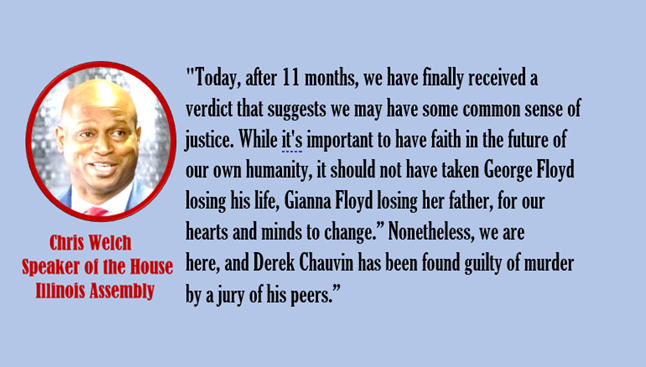Believe it with your eyes.
For the first time in Minnesota history, a police officer has been convicted for killing a civilian while on duty. Derek Chauvin is now a convicted murderer for killing George Floyd in Minneapolis in May, 2020.
Just 10 hours after deliberating Chauvin’s fate, jurors returned with a stunning verdict. Guilty of second-degree manslaughter. Guilty of second-degree unintentional murder. Guilty of third-degree murder.

In Chicago’s Black community, the streets were calm as residents awaited the verdict. Few businesses boarded up their windows. Bronzeville’s 47th Street business district was busy as usual. The windows on Mariano’s supermarket near 39th and King Drive were free of plywood. In Englewood, an AT&T store in the shopping center at 63rd and Halsted was boarded up. Whole Foods kept its windows unprotected.
Businesses in the South Shore community, hit hard during last year’s protests, were on high alert. The Jewel-Osco supermarket at 75th and Stony Island was boarded up Tuesday, April 20. So was the Local Market, a Church’s Chicken restaurant and an Advance Auto Parts.
Reverend Marvin Hunter, the great uncle of teenager Laquan McDonald, murdered in Chicago by Officer Jason Van Dyke in 2014, watched the announcement of the Chauvin verdict with N’DIGO publisher Hermene Hartman at her N’DIGO studio.
“We now have another police officer that has been charged and convicted for what he has done to a Black man in America,” Hunter told ABC7 Chicago. “This is again the beginning of a new era in policing. We still have a long way to go in this country.”
That long way includes giving sufficient jail time to police officers convicted of murder.
Very seldom are they charged for killing civilians. Those who are charged are rarely convicted for crimes. But who knows of any cop who has been given a life sentence or sufficient jail time after being convicted of murder?
After decades of injustices and police acquittals, many Blacks and activists cannot go that far back in time or remember such instances without doing some heavy research.
Chauvin may well be the easiest to remember if he’s given a long jail sentence.

But how long will he be behind bars? Seventy-five years? Forty years? Twenty years? Or will Chauvin appeal his case or have the verdict overturned because of the massive publicity?
Those are questions that may signal that this case is far from over.
While many are celebrating Chauvin’s stunning triple murder convictions, the real decision is eight weeks away. That’s when Judge Peter Cahill will decide how long the disgraced officer will remain behind bars.
The measure of true justice is whether Chauvin’s punishment will fit his crimes. That’s where the real celebrations can begin, or where hopes of real change can come to a devastating end.
Moments after the verdict, a sign at a gas station near George Floyd Square in Minneapolis read “George Floyd: Justice Served?” The skepticism may well be justified.
While it is a time to celebrate this watershed moment, it’s also a time to stay woke. The jury has decided.
Now, the real decision lies in the hands of Judge Cahill, who after closing arguments told Defense Attorney Eric Nelson he might have grounds on appeal, after Congresswoman Maxine Waters (D-CA) attended a protest and urged demonstrators to “get more confrontation- al” if the jury did not deliver a guilty verdict for Floyd’s murder.
In deciding sentencing Judge Cahill will consider factors such as Floyd being killed in front of a child. Though Chauvin faces a maximum sentence of 75 years in prison, legal experts believe that he will be sentenced to a maximum of 40 years.

Chauvin had been out on bail since October, but after he was convicted Tuesday, Judge Cahill revoked Chauvin’s bail and placed him behind bars, where he will remain as he awaits his sentencing.
In a rare moment, he was led out of the courtroom in handcuffs with the phone number of his attorney scribbled in the palm of his hand.
Attorney Benjamin Crump and Black leaders held a press conference that celebrated Chauvin’s conviction.
Like activists across the country, they were overwhelmed with emotion, but two months away is Chauvin’s day of reckoning. Perhaps they should be reminded that Chauvin’s sentencing is the real punishment, and his conviction is simply the official announcement of his guilt.
The risk in this case is that the punishment may seem smaller than the conviction.
Chicago gained some wisdom three years ago after Officer Jason Van Dyke, another cop turned convicted murderer, was found guilty of second-degree murder and 16 counts of aggravated battery with a firearm.
With a notoriously lawless and undisciplined police department, Chicago celebrated after the verdict, but a month later Judge Vincent Gaughan sentenced Van Dyke to just six years and nine months for shooting 17-year-old Laquan McDonald 16 times in 2014.
Celebrations turned to outrage in the Black community.
 While Van Dyke’s conviction was two steps forward, many believed his light sentence took criminal justice reform three steps backwards.
While Van Dyke’s conviction was two steps forward, many believed his light sentence took criminal justice reform three steps backwards.
More than a year after Van Dyke’s conviction, three Chicago police officers accused of covering up McDonald’s shooting—David March, Thomas Gaffney and Joseph Walsh —were acquitted in January 2019 of conspiracy and obstruction charges.
This August, three officers charg- ed for their roles in Floyd’s death will stand trial. After Chauvin’s conviction, hope and optimism remain high for convictions against the other officers.
Officers Tou Thao, Thomas Lane and J. Alexander Kueng are all charged with aiding and abetting second-degree murder and aiding and abetting second-degree manslaughter.
Meanwhile Chauvin remains locked up at the Minnesota Correctional Facility-Oak Park Heights. The correctional facility is in Stillwater, about 25 miles east of downtown Minneapolis. Chauvin is there reportedly through an agreement between the Hennepin County Sheriff’s Office and the Minnesota Department of Corrections, the Department of Corrections spokesperson, Sarah Fitzgerald, told CNN.
According to the Minnesota Department of Corrections, MCF-Oak Park Heights houses about 475 inmates all of whom are designated as either maximum or close custody levels.
A spokesperson said Chauvin will be assigned an orange jumpsuit with a white T-shirt.
Chauvin will likely appeal his convictions, but legal experts say his chances for overturning the convictions are not good.
Chauvin’s attorney may argue that the extensive publicity may have prevented his client from getting a fair trial after Judge Cahill denied his request to move the trial out of Minneapolis.
It’s the same appeal Attorney Daniel Herbert argued after Van Dyke was convicted in 2018, but he was not successful in having the convictions overturned.






